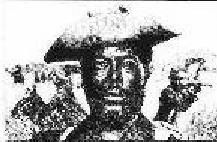GM – FBF – Today I will tell you the story of the only Black man who was with General Armstrong Custer during that final engagement at the Rosebud, Montana Territory. Some people didn’t know this story. Enjoy!
Remember – “Goodbye, Rutten.” – Last words spoken by – Isaiah Dorman
Today in our History – June 25, 1876 – Battle of the Rosebud River – Some people will call it a massace.
On June 25, 1876, Dorman accompanied the detachment of Major Marcus Reno into the battle and was leftbehind when Reno retired across the river to the high bluffs. According to most accounts as in Connell (1985), he gave a good account of himself- shooting several braves with a non-regulation sporting rifle.
According to the account of one
Indian survivor of the battle:
“We passed a black man in a soldier’s uniform and we had him. He turned on his
horse and shot an Indian right through the heart. Then the Indians fired at
this one man and riddled his horse with bullets. His horse fell over on his
back and the black man could not get up. I saw him as I rode by.”
According to Connell 1985, white survivors tell a similar story. Dorman had
been unhorsed but continued to fire at the Indians:
“Pvt. Roman Rutten, unlike Vestal, did fight at the Little Big Horn and his
report of Isaiah’s last stand rings through. Rutten was on a horse that hated
the odor of Indians so his immediate problem was how to stay in the saddle.
During a wild ride he passed Isiaih, whose horse had been shot. The black man
was on one knee, firing carefully with a non-regulation sporting rifle. He
looked up and shouted, “Goodbye, Rutten.”
Other eyewitness accounts from survivors indicate that Dorman was tortured by a group of women who pounded him with stone hammers, slashed him repeatedly with knives, and shot his legs full of buckshot. One odd detail reported is that his coffee pot and cup were filled with blood.
A report that he had been ‘sliced open’ may be a translator’s error; near his body was that of one of the Ree (Arikara) scouts, which had been slashed open and a willow branch stuck in the opening. To the Indians, mutilations were characteristic of different tribes and particular marks meant certain things. As for the torture, the Indians considered him a traitor who had fought with the bluecoats against them.
Dorman’s body was found just out of the timber, near Charley Reynolds’s and he was buried on the Reno Battlefield. It was reinterred in 1877 in the Little Bighorn National Cemetery. In Quartermaster Nowlan’s official report on the 7th’s 1876 Campaign, an item of $62.50 is listed as being owed to Dorman for services rendered in June 1876.
A man named Isaac McNutt, who was a handyman at Ft Rice, attempted to claim the wages; but his claim was dismissed for lack of proof of connection.
Dorman’s Indian widow could not be found and the account may be still drawing interest somewhere in the Army bureaucracy. Research more about the 7th Calvary and the battle at the Rosebud in Montana Territory and share with your babies. Make it a champion day!

